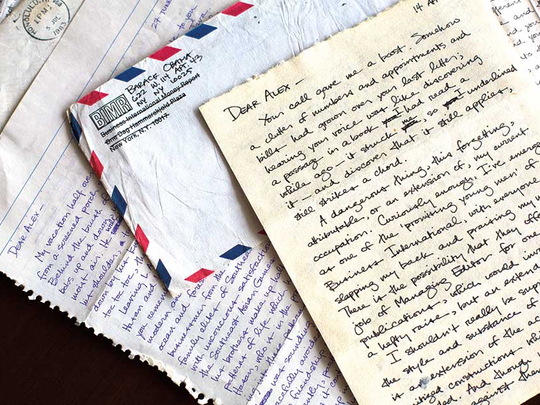
Washington:
“Your call gave me a boost,” reads a letter from a young Barack Obama. It was April 14, 1984, and Obama had transferred to Columbia University in New York City as a junior three years earlier. The letter was addressed to Alexandra McNear, his girlfriend at Occidental College in Los Angeles, where he had transferred from.
“Somehow a clutter of numbers and appointments and bills had grown over your last letter,” wrote Obama, 22 at the time. “Hearing your voice was like discovering a passage in a book I had read a while ago.”
This is one of a series of handwritten notes that have been obtained by Emory University’s Stuart A. Rose Manuscript, Archives and Rare Book Library in Atlanta and will be available to the public for the first time. There are nine letters in total, all from Obama to McNear, and they shed some light on Obama’s formative years — the unease in his own identity, his cerebral nature, his sense of isolation and even the mundane aspects of being a college student.
The notes were written from the autumn of 1982 to the spring of 1984. They have been written about previously, including by David Maraniss in his 2012 biography of Obama. Rosemary M. Magee, the director of the library, declined to reveal who had the letters before the library obtained them, other than to say that library officials had been contacted by “someone in the rare book world” who had acted as a middleman.
“What we learn about is a young man who is yet to become or even dream about becoming President Obama,” Magee said. “It’s a story of a journey over a couple of years about a sense of self-understanding, self-definition and his understanding of himself and place in the world.”
Indeed, in a letter dated April 1, 1983, Obama wrote, “I feel sunk in that long corridor between old values, actions, modes of thought, and those that I seek, that I’m working towards.”
The letters are written in cursive and feature the occasional cross-out, and the correspondence is often more cerebral in tone, rather than romantic.
“These letters aren’t particularly personal,” said Andra Gillespie, an associate professor of political science at Emory University. “You’re coming in at these letters at a point in President Obama’s and Alex McNear’s relationship where you can see the arc of the break-up that’s going to happen. There’s no break-up letter per se, but you can see there are a couple of post-break-up letters.
“Their relationship, at the point that we’re reading it, is very intellectual, and they’re clearly struggling with each other,” Gillespie added. “They’re both trying to find themselves, and they’re having tough intellectual conversations with each other.”
In a letter from June 27, 1983, that Obama wrote from Indonesia, he said that while he thought of McNear often, he was confused about his feelings.
“It seems we will ever want what we cannot have,” Obama wrote. “That’s what binds us. That’s what keeps us apart.”
In that same letter, Obama mused on being an outsider in Indonesia, where he was visiting his mother and sister.
“I can’t speak the language well anymore,” he wrote. “I’m treated with a mixture of puzzlement, deference and scorn because I’m American, my money and my plane ticket back to the US overriding my blackness. I see old dim roads, rickety homes winding back towards the fields, old routes of mine, routes I no longer have access to.”
In addition to his introspection, there are also indications of how Obama’s political views were shaped.
“Salaries in the community organisations are too low to survive on right now,” Obama wrote on November 15, 1983, while looking for work in New York City, “so I hope to work in some more conventional capacity for a year, allowing me to store up enough nuts to pursue those interests next”.
And in perhaps the clearest indication of where Obama’s future was to be, he wrote on April 14, 1984, while working for Business International Corp. in New York City, “My ideas aren’t as crystallised as they were while in school, but they have an immediacy and weight that may be more useful if and when I’m less observer and more participant.”












